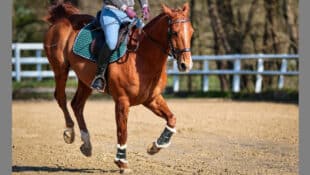Now that we're back on the trails (and in the trail classes), your horse needs to be comfortable and trustful while crossing water.
While training horses is undoubtedly an art, more recently it is also a well-studied science; we know much more about teaching behaviours.
Every foal has a different personality, and the more independent ones can often be gently weaned earlier; here are two methods.
A new study shows that horses possess higher intelligence and are more cognitively advanced than we previously gave them credit for.
Help manage stress, build confidence, and promote communication between you and your horse with these simple in-hand exercises.
Teach your horse to calmly accept the sound, feel and smell of fly spray with this “advance and retreat” method.
It’s normal for horses to become somewhat distressed when separated from their friends, but extreme anxiety can cause dangerous situations.
Knowing your horse's fear threshold and how to handle emergency situations on the trail will ensure safer, fun rides.
Horse behaviour consultant Dr. Robin Foster answers questions about identifying a horse's emotional state ‒ and what to do to improve it.
It's a great way to bond, develop trust, and keep you both motivated during the endless winter/spring arena months.
Certified bit-fitter Tammy Levasseur discusses why proper bit and bridle fit is so crucial, and explains the new rein contact technology.
We tend to overlook ground manners sometimes but a horse that fidgets or wanders off while being mounted can be both annoying and dangerous.
Even the happiest 'super yes horse' can lose enthusiasm and become miserable ‒ and we humans are usually the ones to blame.
The winter months are a great time to go back to basics if your horse has been displaying resistance, tension, imbalance or behavioural issues.
For one woman, rescuing unwanted and abused horses is more than a way of life; it’s also an "accidental" art form.















